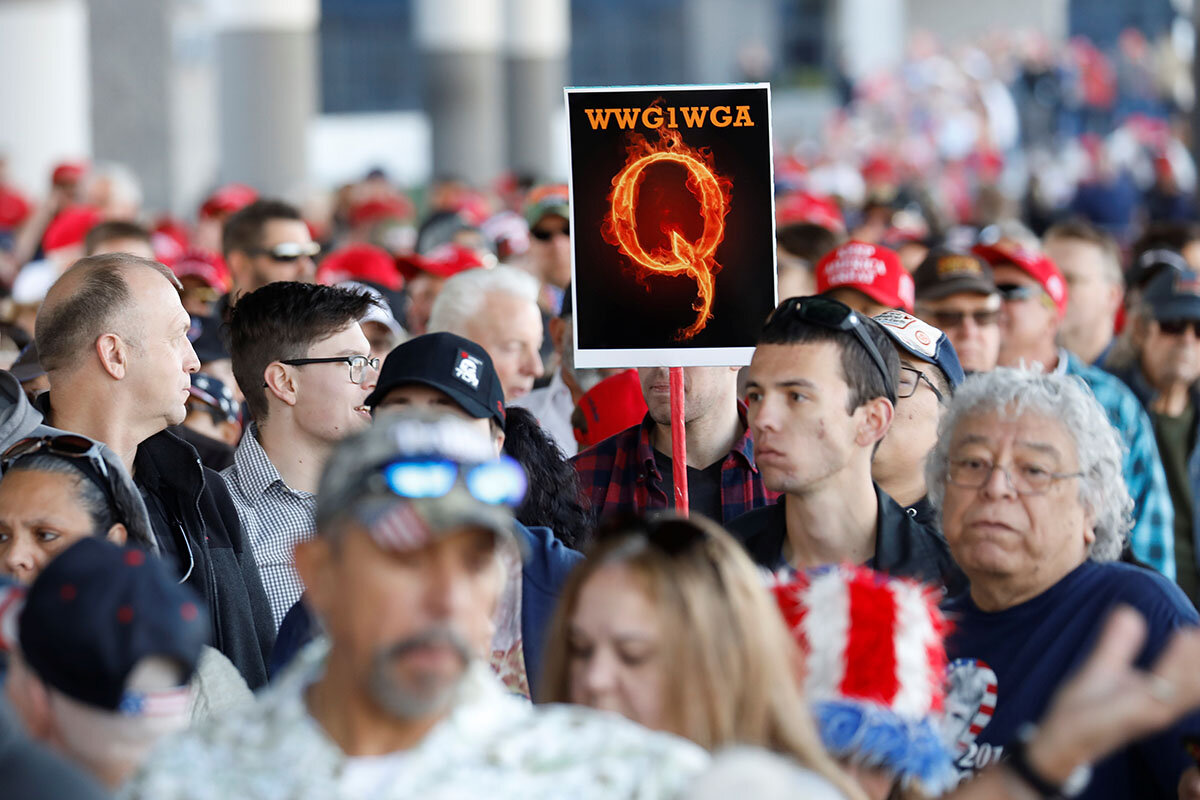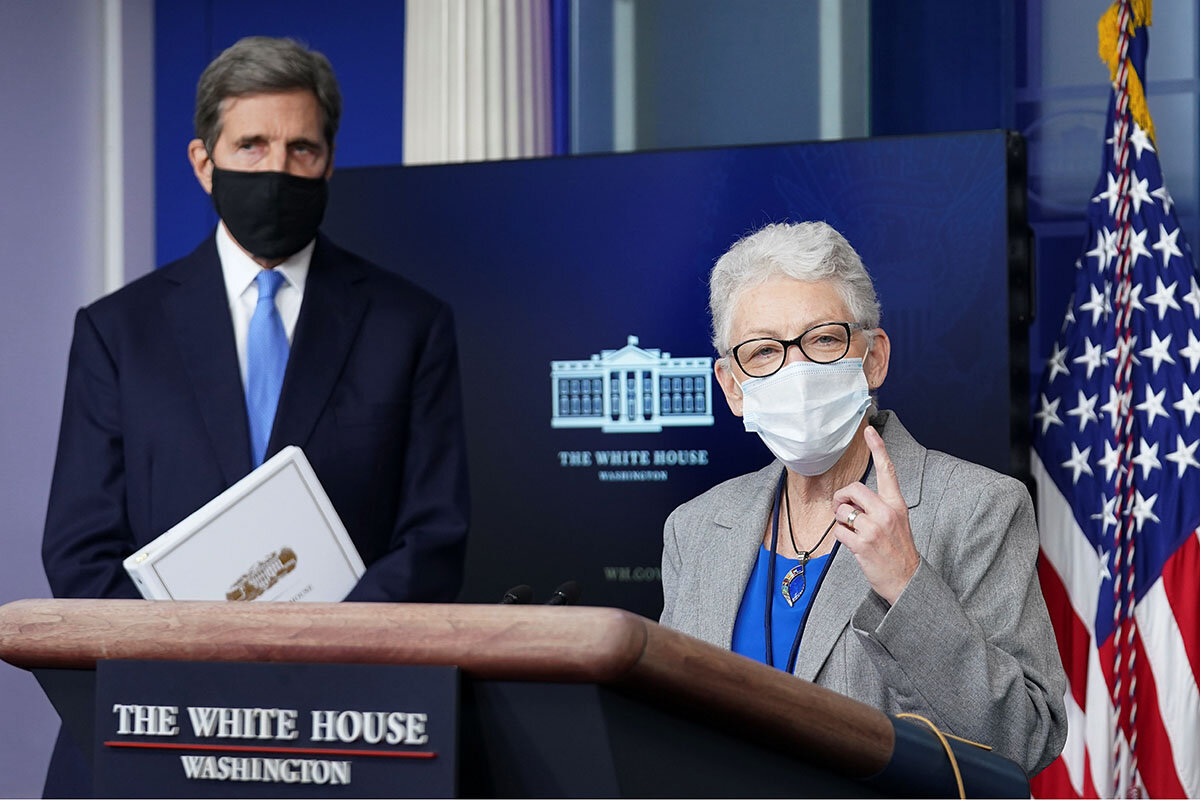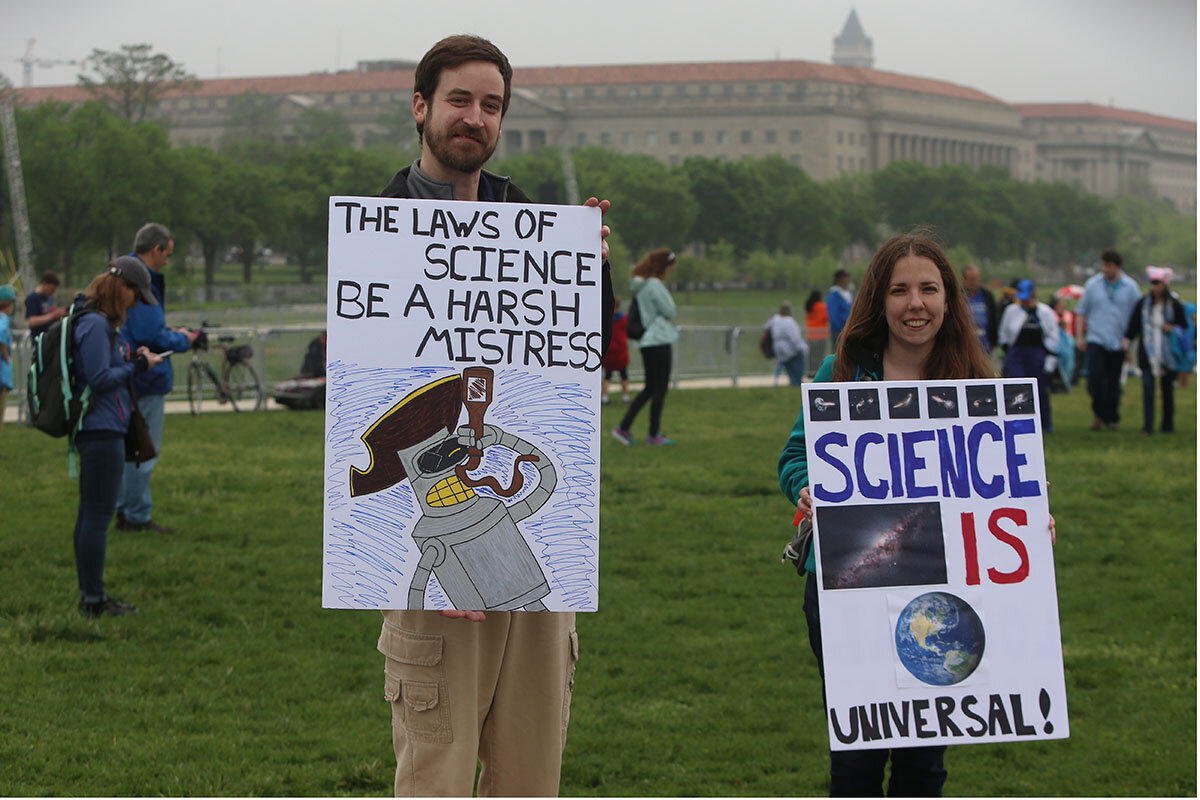A common theme in U.S. inaugural addresses is for the newly sworn-in president to identify what he sees as the country’s biggest problem. For Ronald Reagan, it was government overreach. For Barack Obama, it was “our collective failure to make hard choices.” For Franklin Roosevelt, it was fear itself.
For Joe Biden, it was a breakdown of national cohesion, common purpose, and reality’s most fundamental distinction.
“There is truth, and there are lies,” said President Biden. “And each of us has a duty and responsibility ... to defend the truth and to defeat the lies.”
That an incoming U.S. president devoted part of his inaugural address to insist that facts are, in fact, factual reveals just how much of a beating the truth has taken. Over the past five years, politics have motivated huge swaths of the American public to abandon not just facts, but also the system of logic and standards of evidence used to establish facts in the first place. This phenomenon is widely known as “post truth.”
It didn’t start with Donald Trump and hasn’t ended with his departure. But his presidency pushed the boundaries. Notable falsehoods ranged from the seemingly petty, such as his inflation of inauguration attendance and his apparent altering of a National Weather Service map with a Sharpie, to the momentous, such as his claims that China was paying for U.S.-imposed tariffs or that the coronavirus pandemic was “very much under control.” Most damaging were his baseless claims that the 2020 presidential election was stolen. On Jan. 6, those claims culminated in a mob of Trump supporters storming the U.S. Capitol, an attack that cost the lives of five people.
Now, a new president has arrived with a stated priority on truth-telling. But as important as that can be, many experts on public discourse say solutions need to extend beyond the corridors of Washington into our news outlets, schools, and neighborhoods. They’ll range from the institutional to the interpersonal. Overcoming the post-truth era will require a renewed public emphasis not just on science, but also on thinking scientifically or critically.
“There is no silver bullet here,” says Anthony Leiserowitz, who, in his role as director of the Yale Program on Climate Change Communication, has spent the bulk of his career thinking deeply about the truth and its opposite. “Really, it’s a portfolio you need, a whole variety of approaches, none of which is going to solve all this by itself.”
If a healthy democracy requires grassroots engagement, many observers also see a need for institutional change at the top.
President Biden has sent strong signals that he intends to push for just that. The scientific community has largely welcomed his selection of advisers with strong research backgrounds, particularly his elevation of a science adviser to a Cabinet-level position. His decision to rejoin the Paris Agreement on climate change showed his acceptance of a scientific consensus that Mr. Trump flouted.
President Biden’s “wartime” strategy to combat the pandemic has also drawn praise as a fact-grounded response. Speaking on NBC in late January, former FDA Associate Commissioner Peter Pitts praised his efforts to collaborate with states on the logistics of delivering the vaccine. “Science is back,” he said. “That’s really good news.”
That said, it remains to be seen how broadly Mr. Biden and his now-ascendant fellow Democrats in Congress will actually hew to scientific understanding.
Mr. Biden’s coronavirus policy, for instance, departs considerably from the scientific consensus that the most effective way to combat the virus’s spread is with a national stay-at-home order, a move that some of his own science advisers had called for, prior to walking back their comments.
Climate policy under Mr. Biden may similarly reveal an attempt to balance scientific understanding with political expediency. He calls for full-scale efforts to address climate change, yet has kept the door open to the process known as fracking – the injection of water, sand, and other chemicals into bedrock formations to extract fossil fuels. Fracking has consistently been shown to be a driver of global warming, but has also greatly contributed to the rise of the United States as a global exporter of fossil fuels.
A tool of authoritarians
The Jan. 6 assault on the U.S. Capitol illustrated how the unmooring of politics from facts can threaten the very foundations of democracy. During the Second World War and the years that followed, writers like George Orwell and Hannah Arendt memorably described how pervasive, bald-faced political lying serves the interests of totalitarianism, for example.
“Post truth is the political subordination of reality,” says Lee McIntyre, a research fellow at the Center for Philosophy and History of Science at Boston University and the author of the 2018 book, “Post Truth.” “The ideal subject of totalitarian rule is not the convinced ideologue," he says, paraphrasing Arendt. "It’s the person for whom true and false and right and wrong don’t exist.”
But in recent years, misinformation – and its intentional sibling, disinformation – have come to play an outsize role in American politics, thanks in part to the rise of social media. A study published in October by the German Marshall Fund of the United States found that, from 2016 to 2020, Facebook interactions with news articles from sites that publish false or misleading content rose by 242%, with much of the increase happening in 2020.
“The structure of how we share information about the world has been radically decentralized,” says Dr. Leiserowitz. “We’ve entered a world in which anyone can be a journalist, a contributor to the discourse. But everyone is also expected to be an editor, to distinguish between what’s real and what’s not.”
Online misinformation is shifting Americans’ perceptions of reality. According to a December NPR/Ipsos poll, 17% of respondents aligned themselves with the QAnon conspiracy theory, saying they believe the statement that “a group of Satan-worshiping elites who run a child sex ring are trying to control our politics and media.” Fewer than half (47%) identified the statement as false.
None of this is to suggest that Americans don’t care about the truth. They clearly do: The same poll showed that more than 8 in 10 Americans are concerned about the spread of false information. As Nancy Rosenblum, a Harvard University professor emerita of Ethics in Politics and Government, points out, people don’t typically deny empirical reality when, say, calculating their grocery budgets. “We don’t do this outside of politics,” she says.
Near the end of Mr. Trump’s presidency, America’s institutional patience for misinformation and conspiracy theories seemed to begin wearing thin. Following the Capitol attack, Mr. Trump was banned by Twitter and Facebook. On Thursday, the U.S. House of Representatives voted largely along party lines to bar Rep. Marjorie Taylor Greene of Georgia from serving on committees, in light of her record of inflammatory and unfounded statements rooted in conspiracy theories.
“Somebody who’s suggested that perhaps no airplane hit the Pentagon on 9/11, that horrifying school shootings were pre-staged, and that the Clintons crashed JFK Jr.’s airplane is not living in reality,” said Senate minority leader Mitch McConnell, in an uncharacteristically harsh rebuke of a fellow Republican.
Fighting lies with facts – and science
How can Americans more broadly elevate the place of facts in political discourse? The solution lies in education, says Mona Weissmark, an adjunct associate professor of psychiatry and behavioral sciences at Northwestern University’s Feinberg School of Medicine in Chicago.
“People are not, in high school or in college, trained to have any kind of scientific reasoning background,” says Dr. Weissmark. “They can’t make sense of the conflicting information.”
Dr. Weissmark says that scientific thinking – an approach that tests facts empirically, examines assumptions, considers alternative hypotheses, invites others to challenge conclusions, and whose findings always remain open to revision – can be taught.
“The good news is it’s easily fixable,” she says. “It’s totally possible. I’ve been seeing it for years.”
One simple, effective technique for combating falsehoods is called inoculation theory, says Dr. Leiserowitz. Research indicates that offering people gentle descriptions of misinformation and a counterargument in advance can help them ward off future lies.
For instance, you could say to someone, “You may hear that there is no scientific consensus on global warming. But, in fact, surveys have found that 97% of climate scientists agree that human-caused climate change is happening.”
“When you inform people of that ahead of time, you’re training them to become more critical consumers of information,” Dr. Leiserowitz says.
Such efforts to plant seeds of truth may not work with everyone, given human tendencies such as “motivated reasoning” (reaching the conclusions one desires) or “confirmation bias” (interpreting new information in a way that supports one’s prior viewpoints).
But faith in falsehoods is by no means irreversible. The political scientists Ethan Porter of George Washington University and Thomas J. Wood of Ohio State University have been testing the issue in survey research since 2016. “We found that when presented with factually accurate information, Americans – liberals, conservatives and everyone in between – generally respond by becoming more accurate,” they wrote in Politico last year.
From skeptic to realist
Public debate over climate change has been a forerunner of wider battles today. Investigative journalists have revealed that scientists at big fossil fuel companies knew about climate change decades ago but kept their findings secret. Instead of taking action, they bankrolled skeptics to spread doubt.
One of those skeptics was Jerry Taylor, who, from the late-1980s to the late-2000s was, in his words, a “superspreader of misinformation” about climate change.
Most of that time was spent as the head of the Cato Institute’s energy and environment program, where he would assail the claims of climate scientists on broadcast news segments, share convincing but scientifically skewed talking points with journalists, and generally do his best to persuade people that there was little cause for alarm over global warming.
Today, however, Mr. Taylor is president of the Niskanen Center, a Washington, D.C., think tank that advocates, among other things, a carbon tax.
What happened? As Mr. Taylor tells it, his journey from denialist to realist began in the mid-2000s, after he appeared on TV with a climate expert Joe Romm. Mr. Taylor says that, in the green room after the segment ended, Dr. Romm challenged him to go back and re-read the source material they were disputing.
He did, and he found that Dr. Romm was right. From there on, Mr. Taylor says that he took greater care with checking his sources and challenging the assertions of Cato’s scientific advisers. “I was absolutely incredulous and really angry over the fact that I was being used as a conduit for misinformation,” Mr. Taylor says.
Gradually, Mr. Taylor’s views came to align with those of mainstream scientists who said that humanity’s influence on the climate is significant, and, later on, with those of mainstream economists who said that the costs of inaction greatly outweigh the costs of action.
Mr. Taylor doubts, however, that his own conversion experience can be widely replicated. “I’m not really a microcosm of how to bring us into a truth-based world,” he says.
He offers two reasons for this. First, part of his job at Cato was to engage his opponents ideas, and doing so requires a degree of intellectual honesty. “If you’re a serious actor in the think tank community, it’s virtually impossible for you to sweepingly dismiss expertise,” he says. “It’s called a think tank, not a grunt tank.”
Second, Mr. Taylor found that he was becoming less ideologically libertarian and less resistant to the idea of collective action in some circumstances. “I began to lose faith in the broader libertarian catechism that I was swimming in,” he says.
Mr. Taylor’s willingness to examine the facts without ideological prejudice, alongside an openness to changing one’s mind, are key elements of the scientific method. But these elements are not being cultivated by today’s conservative elite, he says.
A “crisis of trust”
Even if U.S. schools were to begin emphasizing scientific reasoning above all else, change wouldn’t come overnight, says Dr. Weissmark at Northwestern.
One reason is that any post-truth reconciliation will need to address emotional pain as well as promote scientific reasoning, she says. Dr. Weissmark, who is notable for her groundbreaking research that brought children of Holocaust survivors face-to-face with children of Nazis, says that today’s ideological polarization is correlated with an increase in stress, anxiety, and interpersonal problems that are unlikely to go away by themselves.
“The divide is so deep, and it’s playing out in how people take in facts,” she says.
Some observers say that it’s this lack of trust – between individuals and between individuals and institutions – that will need to be overcome for America to return to a fact-based political culture.
“This crisis of truth is really also a crisis of trust (in the institutions and practices of democratic governance and the belief that more often than not these function in fair and reliable fashion),” writes Cynthia Hooper, an associate professor of history at the College of the Holy Cross in Worcester, Massachusetts, in an email to the Monitor.
This crisis, she writes, is “making it difficult for people on either side of the political spectrum to embrace ideas of moderation or champion rhetoric about ‘coming together.’”
Lee McIntyre, the Boston University philosopher, agrees that rebuilding trust is “the only way forward. ... When we begin to talk to one another again, that’s when we grow some trust,” he says.
But how?
Harvard’s Dr. Rosenblum points to a concept as ancient as it is familiar: neighborliness.
“The sphere around home is absolutely vital, says Dr. Rosenblum, whose books include “Good Neighbors: The Democracy of Everyday Life in America,” in 2016, and “A Lot of People Are Saying: The New Conspiracism and the Assault on Democracy,” in 2019.
“Take COVID as an example,” she says. “When people would say ‘how are you feeling today,’ it becomes an intimate important question. It can be the last preserve of reciprocal and democratic relations.”
Dr. Rosenblum, who dislikes the phrase “post truth” and prefers “national reality disorder,” expects that it will linger in state and federal politics for perhaps another decade, but is ultimately optimistic that it will come to an end.
“The beating heart of democracy has always been civil society,” she says, citing how groups like 350.org have rallied public support for climate action over the past decade. Today, two-thirds of Americans say that the government is not doing enough to combat global warming, according to Pew Research Center. “The kind of opposition that changes the minds of the public has come from civil society.”







